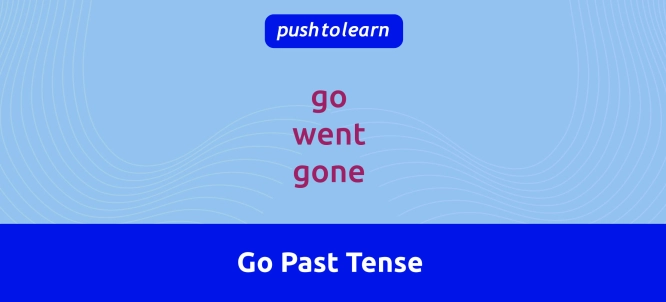by PushtoLearn
Go Past Tense
Table of Contents
Go Past Forms - Exercises
These exercises test different forms of the verb GO and IRREGULAR VERBS
Meaning
The verb "go" means to move from one place to another, to travel, or to engage in an activity.
Example:
-
"I go to the park every weekend."
-
"She goes to the library to study after school."
When referring to past actions, "go" changes to "went."

Forms of "Go"
|
Tense |
Form |
Example Sentence |
|
Present |
go |
"I go to work by train every morning." |
|
Past |
went |
"Yesterday, we went to the beach." |
|
Past Participle |
gone |
"She has gone to Italy for her vacation." |
|
Present Participle |
going |
"They are going to the park right now." |
Examples of "Go" in Sentences
Past Tense (went):
-
"He went to the market to buy some vegetables."
-
"We went to the museum last weekend."
-
"I went to bed early because I was tired."
Past Participle (gone):
-
"She has gone to the store, and she’ll be back soon."
-
"They had gone to the park before it started raining."
-
"The book is gone from the shelf—I wonder who took it."
Common Mistakes with "Go"
1. Using "goed" instead of "went":
A common error is adding "-ed" to "go" to form the past tense, which is incorrect.
-
Incorrect: "He goed to the store yesterday."
-
Correct: "He went to the store yesterday."
2. Mixing up "went" and "gone":
Learners often confuse the simple past tense "went" with the past participle "gone."
-
Incorrect: "She has went to the meeting already."
-
Correct: "She has gone to the meeting already."
-
Incorrect: "I had went home before the rain started."
-
Correct: "I had gone home before the rain started."
3. Forgetting to use "going" for ongoing actions:
Learners sometimes use "go" instead of "going" for actions that are currently happening.
-
Incorrect: "I am go to the gym right now."
-
Correct: "I am going to the gym right now."
-
Incorrect: "They were go to the party when I called."
-
Correct: "They were going to the party when I called."
4. Using "went" for future actions:
Learners sometimes use "went" instead of "will go" for future events, which is incorrect.
-
Incorrect: "We went to the concert tomorrow."
-
Correct: "We will go to the concert tomorrow."
5. Misunderstanding figurative uses of "go":
The verb "go" has many idiomatic and figurative meanings, such as "go crazy" or "go wrong." Misunderstanding these expressions can lead to errors.
-
Correct: "Everything went wrong during the presentation." (things didn’t work as planned)
-
Correct: "He went crazy when he heard the news." (became extremely excited or upset)
6. Overusing "go" instead of more specific verbs:
Learners might rely on "go" when more precise verbs like "leave" or "travel" would fit better.
-
Incorrect: "I go from my house at 8 AM every day."
-
Correct: "I leave my house at 8 AM every day."
-
Incorrect: "We are going to Italy next summer." (technically correct but could be clearer)
-
Correct: "We are traveling to Italy next summer."
Work on your skills with other Grammar Exercises A1 to practice Irregular Verbs and check roles on Past Simple. Pay attention also to the words like Eat, Grind, Fall.
FAQ
What is the past tense of "go"?
The past tense of "go" is "went."
How do I use "went" in a sentence?
Use "went" to describe actions of going that happened in the past.
Example: "He went to the mall yesterday."
What is the past participle of "go"?
The past participle of "go" is "gone."
Example: "They have gone to the market to buy groceries."
Is "goed" correct?
No, "goed" is not correct. Always use "went" for the past tense and "gone" for the past participle.
Can "go" be used figuratively?
Yes! Example: "She went above and beyond to help us," meaning she exceeded expectations.

